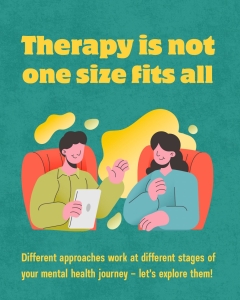Therapy Isn’t One-Size-Fits-All
 Different Approaches for Different Stages of Your Journey
Different Approaches for Different Stages of Your Journey
When it comes to therapy, there’s no one-size-fits-all solution — and that’s a good thing. Just as we all experience challenges differently, the support we need can vary depending on where we are in our journey.
I often speak to people who feel unsure about which type of therapy is right for them — and whether Solution Focused Hypnotherapy is a good fit. So, I wanted to share how different approaches can support different stages of emotional and mental wellbeing, and why being in the “right place” for hypnotherapy can make all the difference.
Person-Centred Counselling
A gentle place to start
Sometimes, what we need most is simply to feel heard — without judgement, pressure, or advice. That’s where Person-Centred Counselling can be incredibly powerful. It offers a safe, non-directive space to explore your thoughts, feelings, and experiences at your own pace.
There’s strong research behind this approach. In fact, person-centred and other humanistic therapies have been shown to be effective in helping people navigate anxiety, low self-esteem, and relationship issues (Elliott, Greenberg, & Lietaer, 2004).
It’s a helpful foundation if you’re feeling overwhelmed or unsure where to begin. It doesn’t tell you what to do — it gives you the space to figure that out for yourself.
Cognitive Behavioural Therapy (CBT)
Tools and techniques for everyday challenges
CBT helps you understand the link between your thoughts, feelings, and behaviours. It’s practical and structured, often used to support people managing anxiety, low mood, OCD, phobias, or negative thinking patterns.
With CBT, the focus is often on challenging unhelpful thought patterns and building helpful coping strategies. There’s a large body of evidence supporting its effectiveness — particularly for anxiety and depression (Hofmann et al., 2012).
It’s ideal for when you’re ready to make sense of what’s going on internally and want tools to feel more in control day-to-day.
Solution Focused Hypnotherapy
Future-focused and strengths-based
Solution Focused Hypnotherapy (SFH) combines talking therapy with the power of hypnosis to help you focus on where you want to be — not just what’s going wrong. It draws from the principles of Solution Focused Brief Therapy (SFBT) and neuroscience, helping you tap into your existing strengths and imagine a more confident, calm version of yourself.
SFBT has been shown to be effective in short-term settings and across a range of issues, including stress and low mood (Kim, 2008). Meanwhile, clinical hypnosis has been shown to help with anxiety, sleep, and confidence (Hammond, 2010).
SFH can be particularly effective once you’ve processed more complex emotions and are feeling ready to move forward. It’s gentle, empowering, and future-oriented — helping you build confidence, feel in control, and take small steps toward change.
The Power of the Relationship
While it’s helpful to explore the different therapy approaches available, research shows that the most important factor in successful therapy is actually the relationship between you and your therapist.
The therapeutic alliance — that sense of trust, collaboration, and understanding — has consistently been found to be the strongest predictor of positive outcomes (Wampold, 2015; Norcross & Lambert, 2018). In fact, the quality of the relationship can have more impact than the type of therapy itself.
This is why personality fit matters, too. We all connect in different ways. Some people need someone calm and nurturing; others benefit from a more energising or structured approach. Therapy should feel like a space where you’re not only safe, but also understood.
It’s perfectly okay to try a few sessions and see how it feels — the goal is to find someone you can build a sense of trust and partnership with.
Why Choosing a Qualified Therapist Matters
It’s important to know that therapy is an unregulated industry in the UK, which means anyone can call themselves a therapist or hypnotherapist without formal training or professional oversight. This makes choosing the right therapist crucial for your safety, wellbeing, and success.
When looking for a therapist, check that they have:
-
Proper qualifications from accredited training programmes
-
Professional insurance to protect both you and them
-
Membership in a reputable professional association, showing they follow strict ethical codes and commit to ongoing development
-
Regular supervision and CPD (Continuous Professional Development), ensuring they’re working safely, ethically, and up to date
These elements are vital to ensure your therapist is experienced, accountable, and working to the highest standards.
So, how do you know what’s right for you?
There’s no wrong starting point — only what feels most supportive for where you are right now. Some people begin with person-centred therapy, move into CBT, and then find SFH helpful when they’re ready to focus on what’s next. Others feel ready for SFH straight away — especially if they’re looking for a gentle, positive boost to their mindset, confidence, or sleep.
What matters most is finding a therapist you trust — someone whose approach feels safe, supportive, and right for your unique personality and needs.
Final thoughts
Just like clothes or shoes, therapy should fit you — not the other way around. What matters is finding an approach that meets you where you are, with kindness, trust, and space to grow.
If you’re curious about Solution Focused Hypnotherapy and whether it might be right for you, I’m always happy to have a chat. You can book a free 15-minute call here — no pressure, just an opportunity to see if it feels like a good fit.
References
-
Elliott, R., Greenberg, L.S., & Lietaer, G. (2004). Research on humanistic–experiential psychotherapies. In M.J. Lambert (Ed.), Bergin and Garfield’s Handbook of Psychotherapy and Behavior Change (5th ed., pp. 493–539). Wiley.
-
Hofmann, S.G., Asnaani, A., Vonk, I.J., Sawyer, A.T., & Fang, A. (2012). The Efficacy of Cognitive Behavioral Therapy: A Review of Meta-analyses. Cognitive Therapy and Research, 36(5), 427–440. https://doi.org/10.1007/s10608-012-9476-1
-
Kim, J.S. (2008). Examining the Effectiveness of Solution-Focused Brief Therapy: A Meta-Analysis. Research on Social Work Practice, 18(2), 107–116. https://doi.org/10.1177/1049731507307807
-
Hammond, D.C. (2010). Hypnosis in the Treatment of Anxiety- and Stress-Related Disorders. Expert Review of Neurotherapeutics, 10(2), 263–273. https://doi.org/10.1586/ern.09.140
-
Norcross, J.C., & Lambert, M.J. (2018). Psychotherapy relationships that work III. Oxford University Press.
-
Wampold, B.E. (2015). How important are the common factors in psychotherapy? An update. World Psychiatry, 14(3), 270–277. https://doi.org/10.1002/wps.20238


 Hello Positivity
Hello Positivity